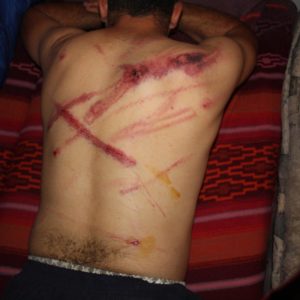Six men walked for six days from Velika Kladuša (BiH) through Croatia to Slovenia. The men crossed the border from Croatia to Slovenia through a river, and were walking in a forest, when they were detected by a woman and a man in a car, who called the police. The men continued walking for ten more km. until they were close to the town Črnomelj, where they were caught by the Slovenian police. The group explained in the interview that they hoped, that the police would take them to an asylum centre and help them to access the asylum procedures.
The respondent clearly said to the police that he wanted to apply for asylum in Slovenia. Afterwards all men were transported in a van to a place that the respondent called “a small camp”, where they were provided with a Palestinian translator. The translator was unkind to the men and before beginning the asylum procedures, he told the men that they had no chance to claim asylum in Slovenia due to their nationalities, and kept calling the men liars.
“We all asked for asylum, but he did not want to accept our application. The translator made a report and he told us: ‘Why you are choosing this country? You do not want to stay in Slovenia, you prefer to go to France, so why are you applying here?’. The translator also told us that if we enter any country, we don’t have the right to apply for asylum. He also told us that we did not have any chance to get protection because we were Algerians and Moroccans. He was very unkind to us”.
According to the group, only one of the men was accepted for the interview that was part of the asylum procedure. This interview was meant to be valid for all six applications (all six men), instead of making one interview to each of the applicants. One of the questions posed to the man was why they did not apply for asylum as soon as they entered the country in some police station, instead of waiting until they got caught in the forest. “You wanted to get into Ljubljana to move to another country”, claimed the police officer who did the interview.
The result of the ‘asylum procedure’ was negative. The men spent one night in this small camp, where they slept in a container on the floor. The following day, all men were forced to sign a paper that was written in Slovenian language, so none of them understood it’s content. The respondent stated that the police kept telling them to sign the paper, so they did.
Around 7pm the Slovenian police transported the men in a van to the Slovenian-Croatian border, to a place that looked like a scrapyard. There, the men were handed over to the Croatian police, who transported them in another van to the Bosnian border, close to the official border check-point in Velika Kladuša. He told me, that during the deportation back to Bosnia, all of them were physically attacked by the Croatian police:
“When we arrived at the border, they told us to leave the car in groups of 2. When I went out of the car with other of my mates, there was one policeman with blue suit that start beating us with a baton. I tried to run away. It was dark and we were in a forest. I thought that if I run I would enter Bosnia and then, they could do nothing to me anymore. But after like 3 meters, they were some men with black suits that I could not see properly because it was dark, and they had night vision glasses, so they could see me. I was running with flip flops and I felt down when I tried to escape. He caught me and was beating me. He put this stick with electric shocks in my neck, after I fell down on the floor, and I swear I thought he wanted to kill me”.
The respondent further explained that he has heart problems, which was the main reason why he left Algeria to get better medical care in Europe. He told the police officer, who was beating him, that he had medical problem with his heart, asking him to stop beating him, but the police ignored this:
“When I was on the floor and the policeman with black suit gave me electric shocks into my neck, I told him that I had heart problems. But he kept beating me. He stopped beating me when he seemed to be tired of it. I got up and wanted to put my shoes on, but again, he started beating me, even when I was already on the Bosnian land”.
He further stated, that the Croatian police stole their money and phones, taking 120 euros from one man, 20 euros from the interviewed himself, and 90 and 60 euros from other men. The Croatian police officers also took the men’s passports.

